
Amid all the chaos, anxiety, and constant battle of the COVID-19 pandemic, our modern-day heroes across the globe are showing their bravery and resilience in helping the most vulnerable.
As Henry Cavill has said, “I think a hero is an ordinary individual who finds the strength to preserve and endure, in spite of overwhelming obstacles.”
Today at Castnoble, we would like to take time and join the campaign of giving thanks to the coronavirus helpers, our modern-day heroes.
First, who are the modern-day heroes? They are in fact the following and here’s how.
- Medical Workers: Since the outbreak, they did not have any break. Medical workers have constantly been looking for ways to prevent the spread and stop the pandemic. Every medical worker around the globe is exhausted. Kudos, you have done great work!
- Grocery Store Workers & Fast Food Crew Members: They have been working for us nonstop to serve our necessities. Even when they are at high risk, they still give us the service we need.
- Delivery Personnel and Warehouse Workers: They mobilize imports and exports to deliver the production of goods slowly. Moreover, every industry is highly dependent on them these days.
- Government Employees: Every nation looks up to its government employees. They are the ones who provide efficient and timely responses for their people.
- Volunteers: They provide people with the necessities during the lockdown, help the elderly, help the medical workers, and essential service employees on the frontline.
To convey our gratitude to our Coronavirus front-liners, our modern-day heroes, we’ve compiled quotes and messages to lift them up a little bit in this way.
12 Quotes to Convey Our Gratitude to Our Coronavirus Helpers, Our Modern Day Heroes
As Maya Angelou has said, “How important it is for us to recognize and celebrate our heroes and she-roes!” To convey our gratitude is as important as supporting them.
If you are looking for some quotes to convey your gratitude to our coronavirus helpers, here they are. Feel free to download them and share them anywhere you want.
- “We must find time to stop and thank the people who make a difference in our lives.” – John F. Kennedy
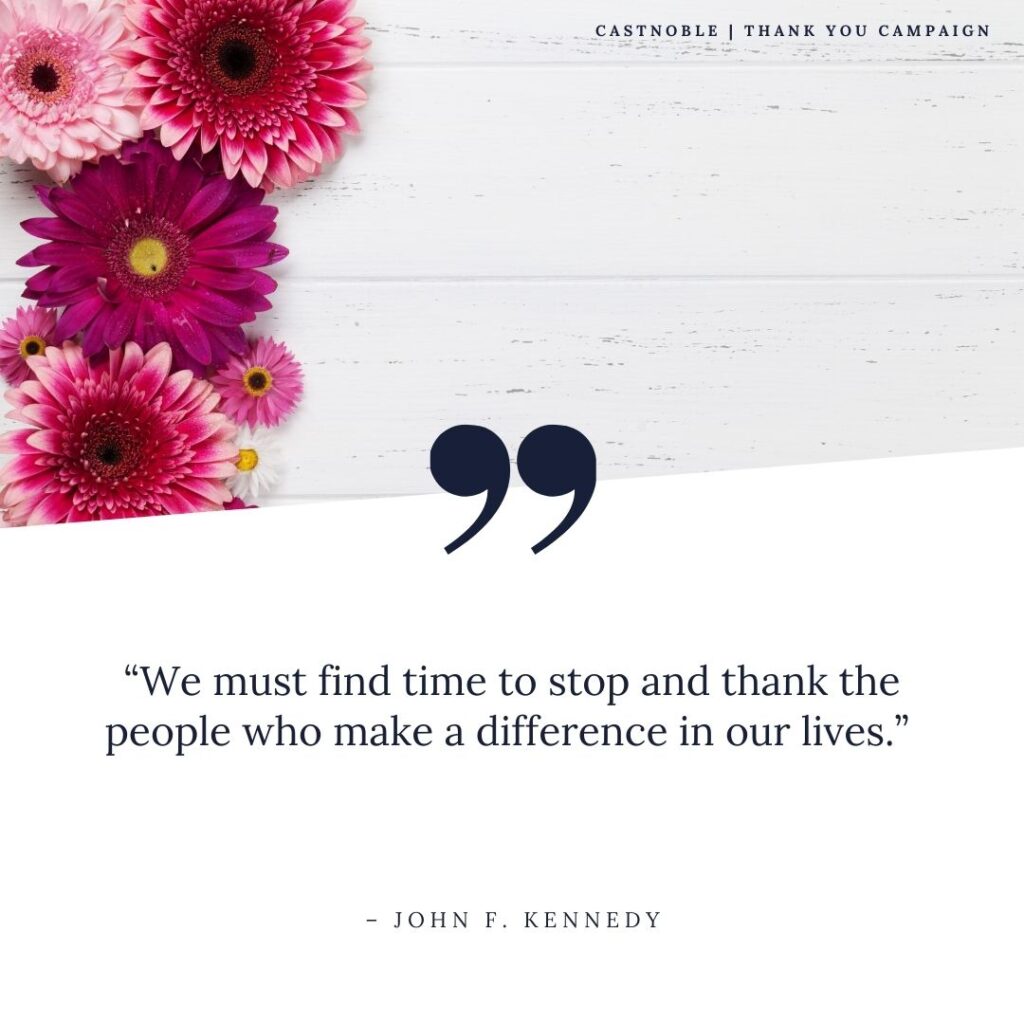
2. “Heroes are those who can somehow resist the power of the situation and act out of noble motives, or behave in ways that do not demean others when they easily can.” – Philip G. Zimbardo
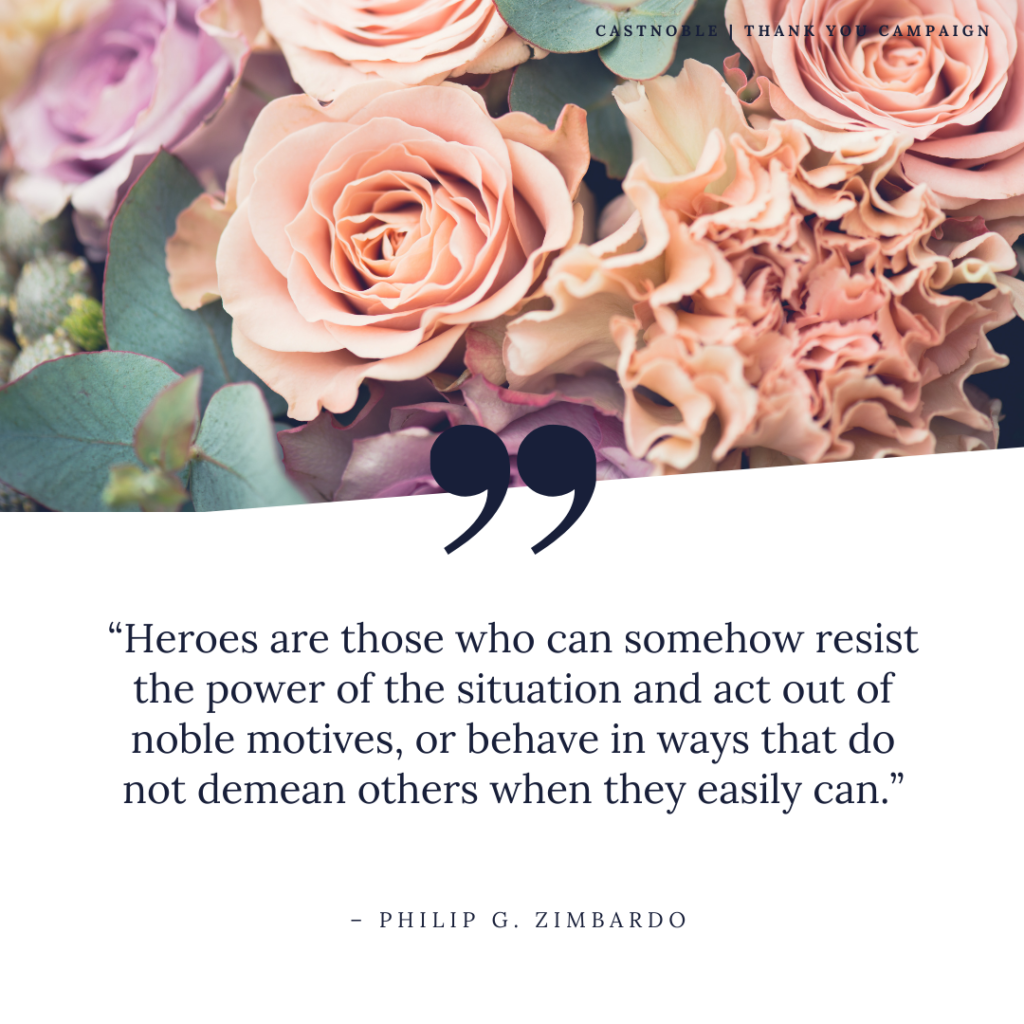
3. “As we express our gratitude, we must never forget that the highest appreciation is not to utter words, but to live by them.” – John F. Kennedy

4. “My heroes are those who risk their lives every day to protect our world and make it a better place” – Sidney Sheldon
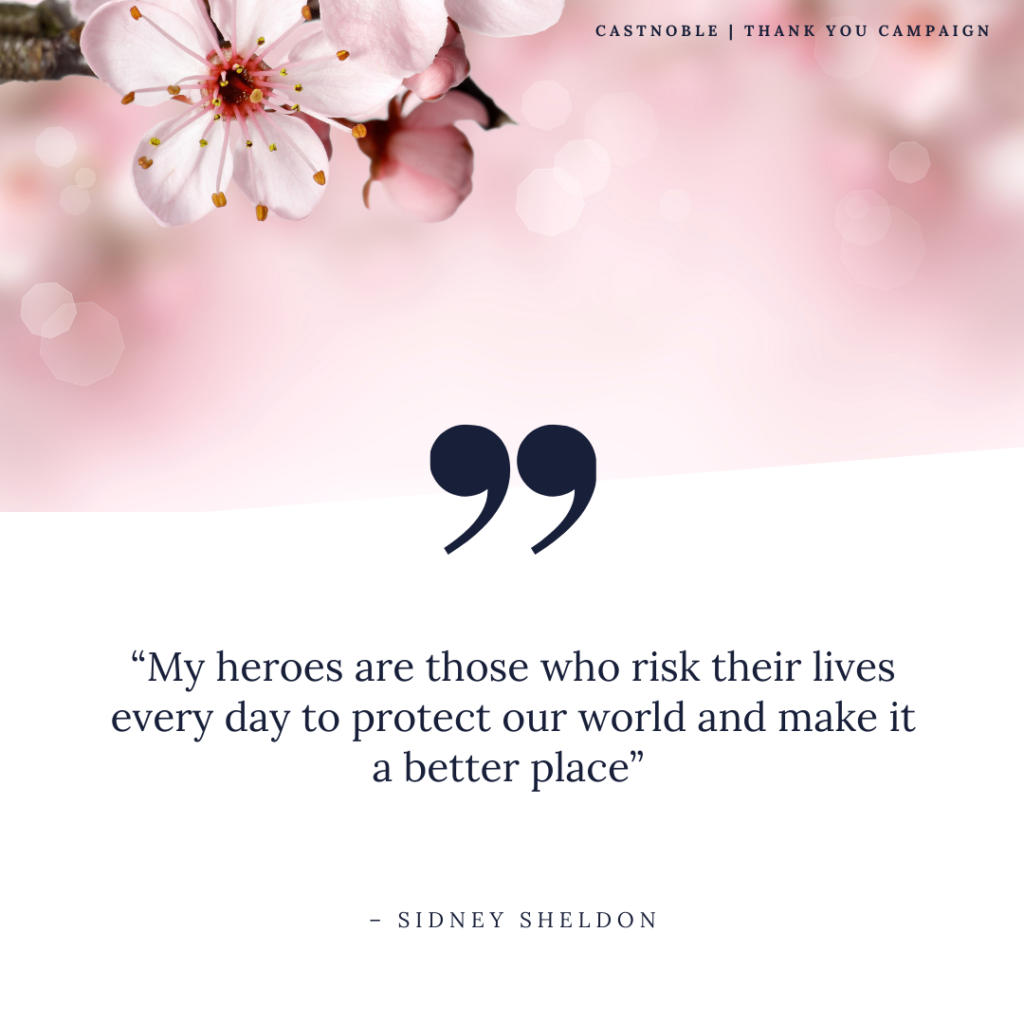
5. “A hero is someone who, in spite of weakness, doubt or not always knowing the answers, goes ahead and overcomes anyway.” – Christopher Reeve
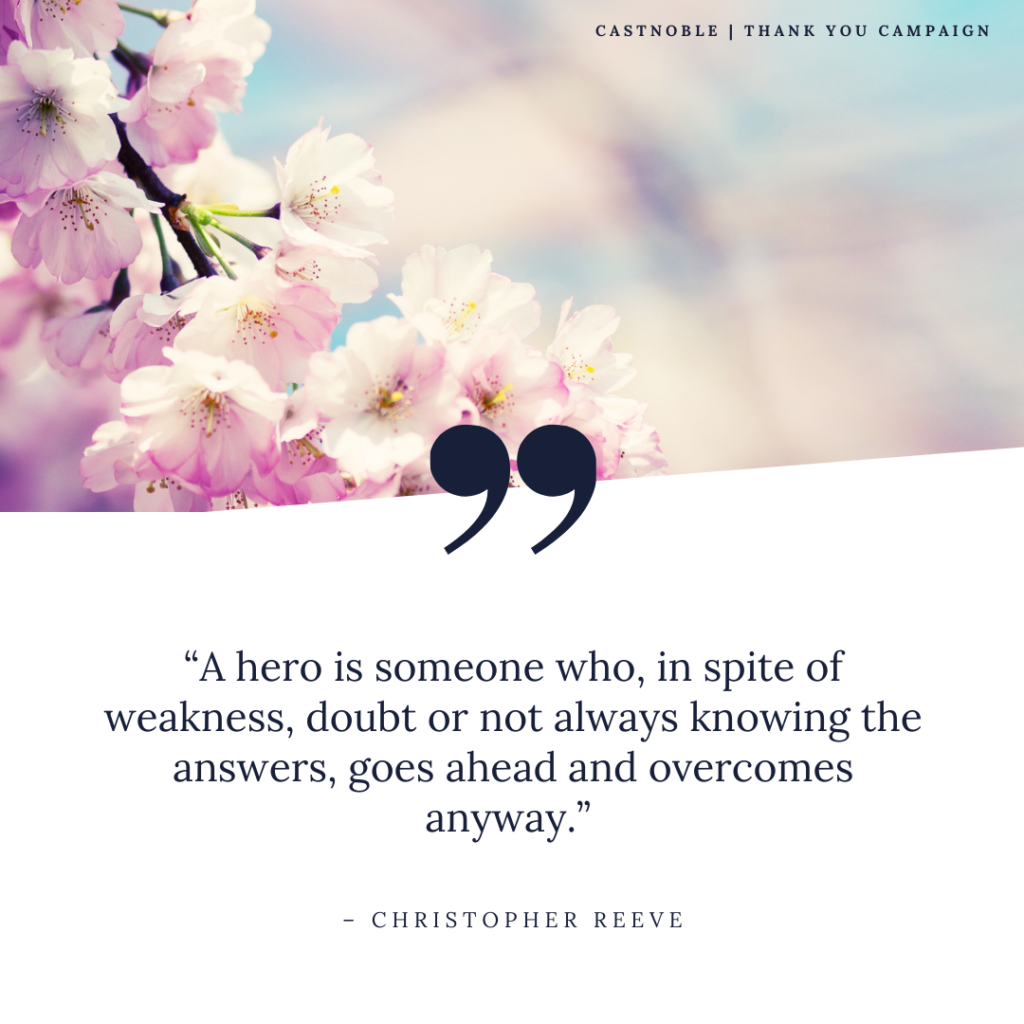
6. “Make it a habit to tell people thank you, to express your appreciation sincerely and without the expectation of anything in return. Truly appreciate those around you, and you’ll soon find many others around you. Truly appreciate life, and you’ll find that you have more of it.” – Ralph Marston

7. “Appreciation can make a day, even change a life. Your willingness to put it all into words is all that is necessary.” – Margaret Cousins

8. “I am of certain convinced that the greatest heroes are those who do their duty in the daily grind of domestic affairs whilst the world whirls as a maddening dreidel.” – Florence Nightingale

9. “There is no better way to thank God for your sight than by giving a helping hand to someone in the dark.” – Helen Keller

9. “Cultivate the habit of being grateful for every good thing that comes to you and to give thanks continuously. And because all things have contributed to your advancement, you should include all things in your gratitude.” – Ralph Waldo Emerson

Amid these fears and challenges caused by the pandemic, we take a moment to recognize and appreciate the sacrifices of our modern-day heroes. We want to share our words of encouragement and gratitude for them.
How Can We Continue to Support Our Modern Day Heroes?
As we have already said and will say it again, saying “Thank You, Coronavirus Helpers” will not just touch their hearts but warm them and will help them to keep pushing forward.
We can show our support and appreciation to our modern day heroes across the globe with these ideas. In times of crisis, they are out there doing service for us. A little act of showing support and gratitude will help them feel appreciated.
You can add the words of appreciation and gratitude that you have read with the following ideas:
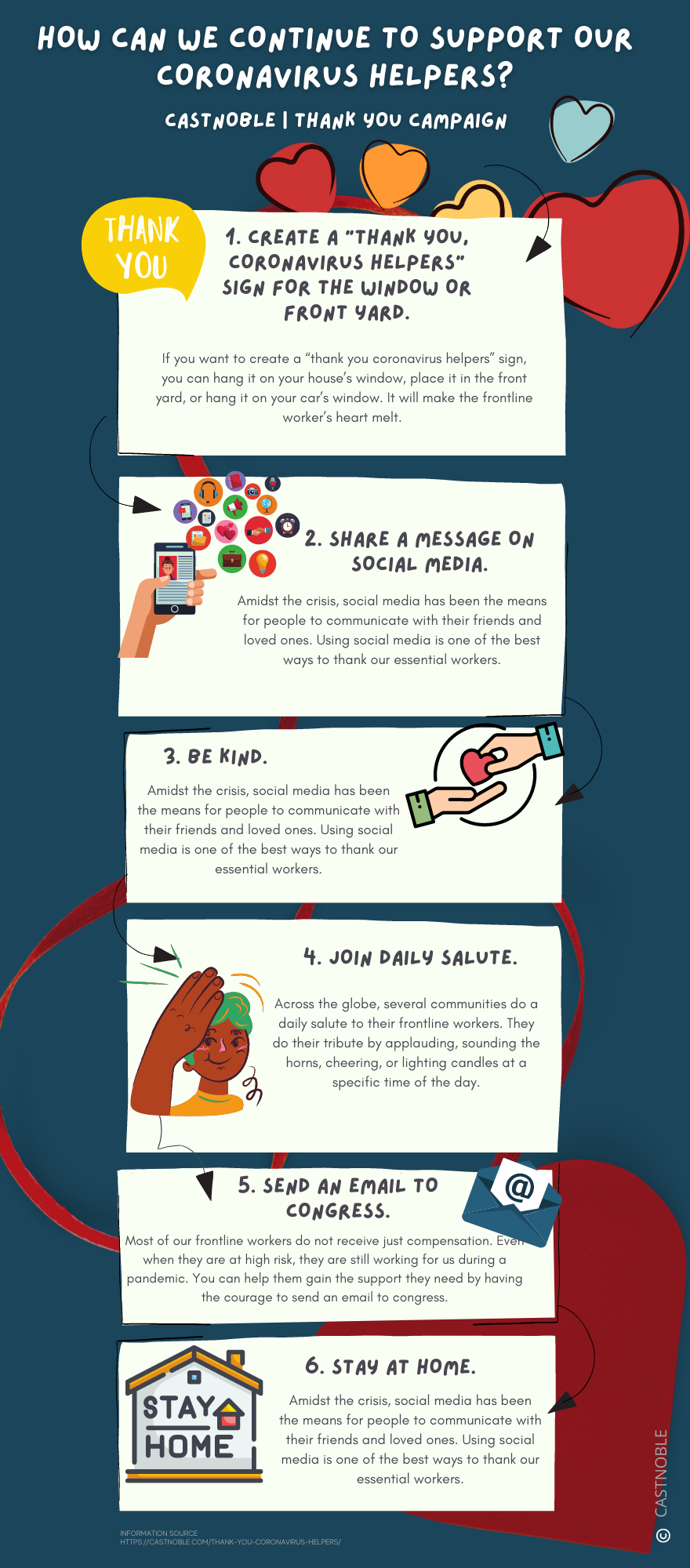
1. Create a “thank you, Coronavirus Helpers” sign for the window or front yard.
If you want to create a “thank you coronavirus helpers” sign, you can hang it on your house’s window, place it in the front yard, or hang it on your car’s window. It will make the frontline worker’s heart melt.
A simple word of appreciation can inspire an individual. You do not know how much strength they build to get through each day.
2. Share a message on social media.
Amidst the crisis, social media has been the means for people to communicate with their friends and loved ones. Using social media is one of the best ways to thank our essential workers.
You can create “thank you coronavirus helpers” youtube videos or give out “thank you coronavirus helpers” doodles. You can tag frontline workers that you know or post a personal message with the hashtag campaigns.
Reshare the posts to other social media to reach more frontline workers.
3. Be kind.
Our essential workers keep supermarkets, convenience stores, and groceries open to making your needs available for you. When you shop at stores, be respectful and kind to the people who work at the shop.
Always observe the proper health protocols to make them feel safe at their jobs. Moreover, do not forget to tell them words of gratitude. A small act will make workers feel appreciated.
4. Join daily salute.
Across the globe, several communities do a daily salute to their frontline workers. They do their tribute by applauding, sounding the horns, cheering, or lighting candles at a specific time of the day.
You can check your community Facebook groups or local newspapers to know the schedule and participate.
5. Send an email to congress.
Most of our frontline workers do not receive just compensation. Even when they are at high risk, they are still working for us during a pandemic. You can help them gain the support they need by having the courage to send an email to congress.
In this economic crisis and uncertainty, several people have to make ends meet, especially those who have lost their job. Calling out the congress will prompt vital services that provide relief for frontline workers and those in need.
6. Stay at home.
Staying at home is an essential thing you can do to support our modern day heroes. When we stay at home, we limit social contact preventing the spread of COVID-19. When you are outside for necessities, always observe social distancing and proper health protocols but, if possible, limit going out.
What Can We Do As Citizens to Show Our Support, other than saying “Thank you Coronavirus Helpers” and Appreciation to Them?
Sometimes, “thank you coronavirus helpers” youtube videos or “thank you coronavirus helpers” signs are not enough. As citizens, there are other ways to show our support and appreciation to them.
Whether it’s National Heroes’ Day, International Heroes’ Day, or an ordinary day, it is apt for us to take the opportunity to honor our brave modern day heroes. We have to celebrate and support them.
Wear a mask, frequently sanitize, follow social distancing. Keep healthy.
Before anything else, our frontline workers are doing everything they can to prevent the spread of COVID-19. Did you remember the slogan that circulated before?
“We came to work for you. Please stay at home for us.”
Thus, the best way to show our appreciation and support for them is to follow the protocols to reduce the chance of spread and transmission of COVID-19. Do not forget the protocols when you go out for errands. But, if it’s not essential or you can do it online, stay at home.
Give a generous tip to essential workers.
Undeniably, we have been dependent on food delivery services, online grocery, and online retail shopping to cope with current events. Whether it’s a handler at courier services, food delivery personnel, garbage collector, or any delivery men or women, do not forget to give a generous tip.
Make it a habit. A generous tip is a token of appreciation for their hard work.
Send food or treats to frontliners.
Aside from giving a generous tip, sending food or treats to our community frontliners is another way to show support and appreciation. You can switch your “thank you coronavirus helper” signs for food or treats instead.
You can prepare a meal and deliver it to the frontliners of the community. If you do not have time to prepare it yourself, you can join and donate to volunteer groups that raise funds to prepare meals for the frontline workers.
Campaigns and Programs to say Thank You Coronavirus Helpers and Support Them.
The World Health Organization (WHO) brings together several partnerships on a series of initiatives to mobilize and motivate people to beat COVID-19 and support the response fund.
Suppose you want to help the people and organizations who are fighting the pandemic and supporting WHO and its partners. In that case, you can drop your monetary donations through the COVID-19 Solidarity Response Fund for WHO.
The donations received by WHO will go towards these activities:
- Enhance equitable access to COVID-19 testing, diagnostics, and vaccines in all countries.
- Reduce mortality and morbidity by providing universal care and giving access and training to the health workforce.
- Protect the most vulnerable by carrying out vaccination campaigns in all countries.
The World Health Organization (WHO) extends its gratitude to all donors and partners who respond with solidarity and generosity. It will indeed support partners and countries in preventing, detecting, and responding to the pandemic.
However, if monetary support is almost impossible on your part, you can join the campaigns organized by WHO.
Join these campaigns to help spread awareness. In this unprecedented crisis, all we need is unity.
The Power of the ‘Thank you Coronavirus Helpers” campaign and The Power of Unity
“Now is the time for unity.” — United Nations
For more than a year, we are still fighting the most dangerous challenge in our lifetime.
Is COVID-19 an unprecedented problem to humans? If it is, it needs a never-ending response too. Will unity gives us the power to halt this human crisis?
Each and everyone is important
We all have a role to play to overcome the pandemic. Health organizations and Nations are responsible and on the frontline to manage the health and socioeconomic crisis we have been facing. If we work together, our unity will help us get through this global challenge.
The World Leader’s Unity
When the nation leaders unite, and the citizens unite and follow science and mobilize the response, we can change and flatten the trajectory of COVID-19. Whether our help is through giving out donations, organizing fundraisers for the coronavirus helpers, or staying at home, it’s a crucial role to play.
Produce Base On What We Can
It is heartwarming to witness how manufacturers step forward in mass producing the needed tools and devices for COVID-19 testing and treatment, including the production of personal protective equipment for our modern day heroes.
Moreover, company leaders are at the forefront of organizing therapeutic, financial, and economic responses for the global pandemic. These enterprises commit millions of their revenue to support the relief efforts for COVID-19.
Solidarity
Indeed, now is the time for us to unite. When the international community unites solidarity, we can put this overwhelming health crisis and socioeconomic consequences to a halt.
We are not alone in this battle, and Fred Rogers reminded us about that. “Look for the helpers. You will always find people who are helping.” From our brave healthcare workers to essential workers in the service sector, we want to say: Thank you, Coronavirus Helpers. We genuinely appreciate your bravery.
What COVID-19 Made Us Realize
The pandemic has been a challenge for all of us. It left us locked inside our homes for more than a year now.
Despite the unity and efforts of our national leaders, health organizations, experts, scientists, and community, the crisis may continue longer than we have expected.
During the first few months of lockdown, all of us were in fear and panic— grocery shelves were empty; face masks, hand sanitizers, even toilet paper were out of sight!
You cannot see a single person down the streets.
For months we feel anxious and afraid of what might come. We are at home not to relax but to survive.
Months passed, slowly, experts and national leaders have come up with several solutions and responses to fight off COVID-19.
During these months, COVID-19 has made us realize that:
1. It’s not who’s opinion or solution is correct. It is doing what is right.
Early on the pandemic outbreak, people who have titles and sit on the higher organization contribute less than those in the field. The nurses advised the physicians and administrators on what to innovate and how to create the best practices.
It made us realize that those who are in higher positions are not always right. What’s right is doing what’s best for all.
2. Easy things are challenging to do.
Following health protocol is an easy thing to do. You only have to wear a mask, sanitize your hand frequently, and maintain social distancing. However, no matter how easy it is, some find it difficult to follow.
The mandatory implementation of these preventive measures has become a difficulty for some. Although it has been more than a year, it’s still a challenge for some to comply, resulting in COVID case relapse.
3. Different generations have their way of coping.
Being in this technologically savvy generation makes coping with physical isolation easier. People can interact easily around the globe with various platforms. More so, it has allowed us to access essential things, including errands, online. You do not have to go out to the grocery to buy some of your necessities.
4. We have to redefine the normal.
We cannot stay stuck in this crisis forever. The task for us to get through the pandemic is to normalize today and find a solution to transform crisis management to care management, an incident command to the recovery stage, and abnormal to new normal.
An almost dystopian situation becomes our reality. We have to respond to the pandemic with scientific solutions.
5. Pay it forward.
Essential service workers and medical practitioners are working day-in and day out for our safety. You can pay it forward by donating goods for the COVID-19 response.
6. Show care and support to our medical front liner and essential service workers.
You can show your care and support by sending words of encouragement and a thank you note for them. Let’s show them our care and support to encourage them to provide optimum care continuously.
7. Only trust key resources.
Amidst the difficult situation, it is a blessing that most of us have access to key resources.
Medical practitioners and health organizations constantly remind the general public of the essential measurements to prevent the spread of COVID-19.
Lucky for some, they can easily access reliable key resources.
However, we still have to become cautious of the information we read online. Some people on social media question the basics of science and discredit what experts say, which leads to non-compliance.
Important Resources about COVID-19
Check these key resources about COVID-19. These are crucial information to help you protect yourself and help the coronavirus helpers prevent the spread of the virus.
Guide to Face Masks:
Face masks protect you and others. It is most effective when everyone wears a mask. Read the following guidelines in wearing a face mask to give yourself and others adequate and effective protection.
How to Select and Use Hand Sanitizer:
Aside from wearing face masks, we should sanitize our hands frequently. Experts, CDC and WHO, recommend washing hands with soap and water.
However, soap and water are not readily available at all times. Thus, purchase and use a hand sanitizer or rubbing alcohol with at least 60% alcohol content.
Read the resource to know how to select the right choice for hand sanitizer and use them properly.
Social Distancing:
It is best to limit close social contact to reduce the spread of COVID-19. However, there are instances you need to go out for errands. Thus, you have to practice safe social distancing.
What to Do When Going Out:
The pandemic has been more than a year already. All of us have to go out again for work, school, or engage in public activities, and we have to practice safety precautions.
Keep in mind these essential advisories.
Improve Hand Hygiene Practices to Help Prevent the Transmission of the COVID-19 Virus:
The World Health Organization (WHO) emphasized the importance of hand hygiene practices. Thus, hand hygiene stations became obligatory.
Any public or private commercial buildings and public transport facilities should have hygiene stations at their entrance or exit way.
Save Lives: Clean Your Hands In The Context of COVID-19:
Hand sanitation will not only protect you from COVID-19 but other infections and diseases too.
Cleaning and Disinfecting Home:
Home cleaning and disinfecting should be mandatory. You have to do it every day and when someone is sick.
Remove most virus particles on surfaces and focus on frequently touched surfaces such as tables, light switches, and doorknobs.
Stress from COVID-19 and How to Cope:
The pandemic outbreak has given us a lot of stress. Anxiety and fear due to the virus can lead to stress, especially our beloved coronavirus helpers in the front line in protecting the community.
We have to recognize stress and build resilience in these trying times. Have a look at these key resources. It might help you get through the day.
Moreover, do not hesitate to ask for professional help.
Get Vaccinated:
Pharmaceutical companies have started distributing vaccines to several countries.
They are deemed safe and effective, but even so, you have to seek proper consultation from your general practitioner before getting vaccinated.
After you have been fully vaccinated, you can start to do the things you weren’t able to do during the pandemic.
These are the basic information to survive the pandemic– physically, emotionally, and mentally.
You can research more studies and key resources on the Internet if you think some of the information you are looking for isn’t here.
Ensure that the information comes from a reliable source.
What’s your idea of saying “Thank you Coronavirus Helpers?” We’ll be happy to know!
References:
WHO coronavirus (COVID-19) Dashboard. (n.d.). Retrieved April 27, 2021, from https://covid19.who.int/
Shutterfly Community. (2021, March 30). The Best Thank You Quotes and Sayings. Retrieved April 26, 2021, from https://www.shutterfly.com/ideas/thank-you-quotes/#Giving-Thanks-Quotes
Globe Telecom, INC. (n.d.). 5 ways to Honor COVID-19 Frontliners on National Heroes day. Retrieved April 26, 2021, from https://www.globe.com.ph/go/shopping-lifestyle/article/covid-19-frontliners-national-heroes-day.html#gref
World Health Organization (WHO). (n.d.). COVID-19 Response Fund. Retrieved April 26, 2021, from https://www.who.int/emergencies/diseases/novel-coronavirus-2019/donate
Love, T. (2020, May 04). 8 Ways to Thank Frontline Workers. Retrieved April 26, 2021, from https://www.unitedway.org/blog/8-ways-to-thank-frontline-workers
Brown, N. (2020, May 12). How Unity and Common Purpose Can Help Us Defeat COVID-19. Retrieved April 27, 2021, from https://www.weforum.org/agenda/2020/05/we-will-defeat-this-virus-with-unity-and-common-purpose/
Diener, M. (2020, November 19). What the Covid-19 Pandemic has Taught Me. Retrieved April 27, 2021, from https://www.aha.org/news/healthcareinnovation-thursday-blog/2020-11-19-what-covid-19-pandemic-has-taught-me
Taylor, D. (2020, February 13). A timeline of The Coronavirus Pandemic. Retrieved April 27, 2021, from https://www.nytimes.com/article/coronavirus-timeline.html
ILO, FAO, IFAD, WHO. (2020, October 13). Impact of covid-19 on people’s livelihoods, their health, and our food systems. Retrieved April 27, 2021, from https://www.who.int/news/item/13-10-2020-impact-of-covid-19-on-people’s-livelihoods-their-health-and-our-food-systems
Haleem, A., Javaid, M., & Vaishya, R. (2020). Effects of COVID-19 Pandemic in Daily Life. Retrieved April 27, 2021, from https://www.ncbi.nlm.nih.gov/pmc/articles/PMC7147210/
Covid-19: Considerations for wearing masks. (n.d.). Retrieved April 27, 2021, from https://www.cdc.gov/coronavirus/2019-ncov/prevent-getting-sick/cloth-face-cover-guidance.html
How to select and use hand sanitizer. (n.d.). Retrieved April 27, 2021, from https://www.cdc.gov/coronavirus/2019-ncov/prevent-getting-sick/hand-sanitizer.html
Cleaning and disinfecting your home. (n.d.). Retrieved April 27, 2021, from https://www.cdc.gov/coronavirus/2019-ncov/prevent-getting-sick/disinfecting-your-home.html
Daily activities and going out. (n.d.). Retrieved April 27, 2021, from https://www.cdc.gov/coronavirus/2019-ncov/daily-life-coping/going-out.html
Recommendations to member states to improve hand hygiene practices to help prevent the transmission of the COVID-19 VIRUS. (n.d.). Retrieved April 27, 2021, from https://www.who.int/publications/i/item/recommendations-to-member-states-to-improve-hand-hygiene-practices-to-help-prevent-the-transmission-of-the-covid-19-virus
Social distancing. (n.d.). Retrieved April 27, 2021, from https://www.cdc.gov/coronavirus/2019-ncov/prevent-getting-sick/social-distancing.html
Stress and coping. (n.d.). Retrieved April 27, 2021, from https://www.cdc.gov/coronavirus/2019-ncov/daily-life-coping/stress-coping/index.html
Vaccines for covid-19. (n.d.). Retrieved April 27, 2021, from https://www.cdc.gov/coronavirus/2019-ncov/vaccines/index.html


